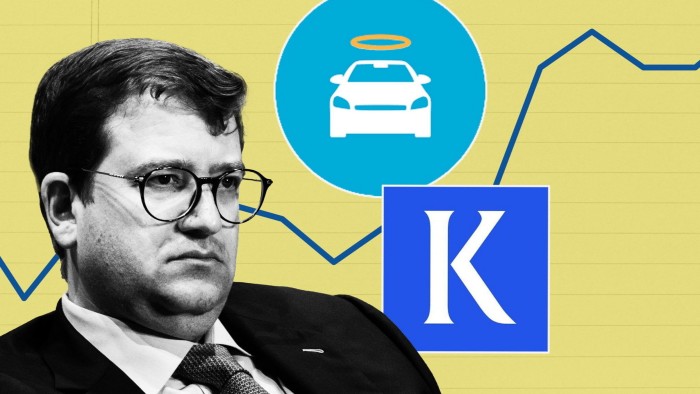When the Arizona-based online used car merchant Carvana was on the brink of running out of cash in early 2023, it hired Kirkland & Ellis, the law firm with the long-standing pre-eminent bankruptcy practice in America.
But rather than filing for Chapter 11 and having a federal judge oversee a restructuring, Carvana artfully reshuffled its balance sheet to raise fresh cash and push out existing bond maturities.
Shareholders, including Carvana’s founding family, avoided having their equity written off to zero, an outcome that would have been a near certainty in bankruptcy court. The retailer has since seen its stock soar from $4 to $350, adding about $75bn in market capitalisation.
Shepherding Carvana through the tense showdown was not one of Kirkland’s many acclaimed bankruptcy specialists but rather David Nemecek, a partner in his forties whose particular skill is dissecting the intricacies of bank loan agreements and bond indentures. Finding loopholes in the legal contracts allowed Carvana to shift collateral and corner existing creditors, forcing bondholders such as Apollo Global to take haircuts on their paper without handing them control of the company.
Nemecek has emerged as the single most powerful adviser to distressed companies, when historically it was the lawyers who had mastered the byzantine US bankruptcy code and charmed the judges in court hearings that had the power to erase their clients’ financial problems.
In the past decade, out-of-court deals where troubled companies raise new cash and swap old debt for new have increasingly replaced bankruptcies as a way for those businesses to secure a new lease on life.
Data from Moody’s shows that between 2010 and 2020, corporate debt defaults were roughly evenly split between “distressed exchanges” — like the one Carvana completed — and Chapter 11 filings where a company formally reorganises under the protection of the court. By the first quarter of 2025, three-quarters of defaults were distressed exchanges, with Chapter 11 filings accounting for less than a tenth of the total.
Nemecek’s other recent high-profile clients include the Saks department store chain and the Warner Bros Discovery media conglomerate.
“It’s been a gold rush for Dave,” said one hedge fund investor who has been on the opposite side of the table from Nemecek in several transactions.

For the legal establishment, the evolving nature of restructurings has forced law firms to reinvent their practices. That has led to the rise of new groups branded “capital solutions” and “special situations”, which draw on multiple subsectors of law.
“The game has changed. Clients do not want a bankruptcy lawyer the way they may have 20 years ago; today, they want a hybrid athlete,” said Vincent Indelicato, who leads the restructuring group at New York-headquartered firm Proskauer Rose.
“This is not your father’s restructuring industry.”
Financing lawyers typically got involved at the outset when M&A deals and leveraged buyouts were being put together. But in an era when private capital is plentiful and debt covenants scarce, these lawyers are increasingly front and centre when these companies begin to unravel.
Distressed companies — often private equity-backed — are turning to financing lawyers to pull off coercive capital raises that pit similarly situated creditors against each other. The “creditor on creditor” violence forces competition for scarce collateral and priority in the debt stack.
These transactions all have the same basic structure. First, raise new senior secured debt by seizing collateral previously pledged to others. Then, these new debt providers are allowed to exchange their previous debt into a higher tier, typically at a modest haircut. Those creditors who are not asked to participate in the new financing and debt swap see the price of their existing paper collapse after the loss of collateral and priority.
The distressed debt community has assigned colourful names to the types of manoeuvres, among them “dropdown”, “uptier”, “double dip” and “pari plus”.

Kirkland dominates these company-side assignments; hedge funds and traditional asset managers themselves increasingly select among a short list of law firms — Gibson Dunn and Davis Polk are among the favourites — to do battle on their behalf. The resulting cat-and-mouse games challenge counsel to devise the most novel offensive or defensive techniques to deploy against the other side.
Moody’s still counts distressed exchange deals as defaults, since typically some of the company’s existing debt is exchanged at a discount to par value. But these refinancings allow company owners — in particular, private equity groups — to avoid officially losing their equity positions even if companies remain insolvent in practice.
Apart from keeping their equity alive, private equity groups avoid the time and expense of bankruptcy where hourly fees exceed $2,500 and routinely add up to tens of millions of dollars in total. The litany of motions and hearings in a Chapter 11 case can require dozens of lawyers billing hundreds of hours over several months.
Law firms have had to reorganise themselves to reduce distinctions between what were previously siloed groups of bankruptcy, leveraged loans, high-yield bonds, private equity and private debt.
Davis Polk, for example, now has its restructuring partners informally specialising in two or three of the group’s five main practice areas.

“Company side bankruptcy lawyers who spent most of their time working on the more or less routine matters in Chapter 11 cases now have less to do,” said Bruce Bennett, a top Jones Day partner who has been a central figure in multiple high-profile blow-ups since the 1980s.
Figures compiled by BankruptcyData for the Financial Times show that large Chapter 11 cases have picked up since the post-pandemic Federal Reserve tightening, with about 50 US cases a year where liabilities exceed $500mn.
However, data compiled by Moody’s tells a fuller story where distressed exchanges dominate corporate restructurings even if bankruptcy filings have nominally increased.
“I started my career as a bankruptcy attorney but now almost all of my time is dedicated to out-of-court restructurings,” said Shai Schmidt, a partner at the litigation firm Glenn Agre.
“There are far fewer Chapter 11 cases generally, and even fewer ‘freefall’ bankruptcies nowadays, which means fewer roles for bankruptcy advisers,” Schmidt said, referring to the complex workouts where the debtor strikes no preliminary settlement with creditors.
Carvana has gone down as the most successful distressed exchange in history. But it has proved to be an anomaly. Moody’s data shows that companies that avoid bankruptcy through a capital raise often go on to default a second time within a couple of years.
Major multibillion-dollar companies including Serta Simmons Bedding, Envision Healthcare and Del Monte Foods have gone on to abruptly file for formal Chapter 11 bankruptcy after previously completing comprehensive capital raises that were supposed to give the respective companies years of breathing space.
Layers of complex debt and litigation from lenders and bondholders who had been harmed in the original distressed exchange have made these bankruptcies contentious. Chapter 11 advisers are quietly hoping that such implosions, which are lucrative for them, will multiply in the coming years.
“You definitely could argue for less need for lawyers specialising in bankruptcy,” said one top corporate lawyer.
“Though the interesting question is if [the Chapter 11 drought] is just a one-time lag, if you believe all these distressed exchanges end up bankrupt anyway.”
Read the full article here




